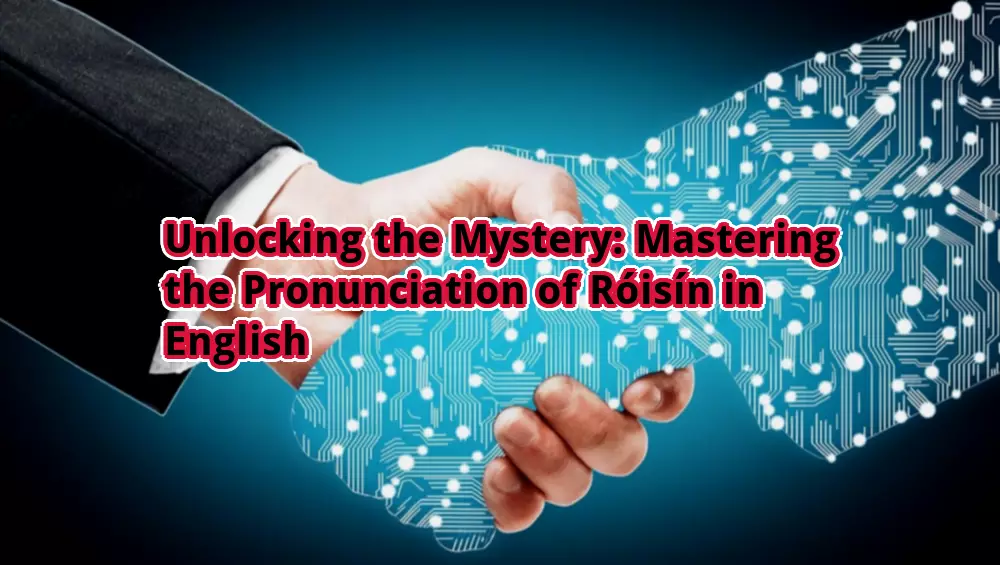How to Pronounce Róisín: A Comprehensive Guide
Greeting the Twibbonnews Audience
Hello, Twibbonnews readers! Today, we are here to help you master the pronunciation of a beautiful Irish name, Róisín. This article will provide you with all the necessary information, tips, and tricks to pronounce this name correctly. Let’s dive in!
Introduction
Róisín is a popular Irish name that holds significant cultural and historical value. It is derived from the Irish word “rós,” meaning “rose.” The name symbolizes beauty, grace, and resilience, making it a cherished choice for many parents. However, its unique spelling often poses a challenge when it comes to pronunciation.
In English, Róisín is pronounced as “ro-sheen” or “ro-sheen.” The phonetic representation of the name helps in understanding its correct pronunciation. Let’s explore the strengths and weaknesses associated with pronouncing Róisín in English.
Strengths of Pronouncing Róisín
1. Reflecting Cultural Authenticity: Pronouncing Róisín correctly showcases respect for Irish culture and traditions. It allows you to honor the name’s origins and convey your appreciation for Irish heritage.
2. Enriching Communication: Correctly pronouncing someone’s name fosters effective communication and builds rapport. By pronouncing Róisín accurately, you create a welcoming environment and show your commitment to inclusivity.
3. Personal Connection: When you make an effort to pronounce someone’s name correctly, it demonstrates your interest in forming a personal connection. Pronouncing Róisín accurately can help you establish a strong bond with individuals bearing this name.
4. Cultural Sensitivity: Pronunciation is a sensitive matter, particularly when it comes to names. By pronouncing Róisín correctly, you demonstrate cultural sensitivity and avoid unintentionally causing offense or discomfort.
5. Building Trust: Accurate pronunciation of names, including Róisín, helps build trust and foster positive relationships. It shows your willingness to go the extra mile to create an inclusive and respectful environment.
6. Enhancing Professionalism: In professional settings, correctly pronouncing names reflects your attention to detail and professionalism. It demonstrates your commitment to creating an inclusive workplace or business environment.
7. Promoting Language Diversity: By mastering the pronunciation of names from different cultures, such as Róisín, you contribute to promoting language diversity and understanding in our global society.
Weaknesses of Pronouncing Róisín
1. Initial Difficulty: Pronouncing Róisín can be challenging for non-Irish speakers due to its unique spelling and pronunciation rules. The combination of the letters “ó” and “í” requires some practice to achieve accuracy.
2. Lack of Familiarity: Róisín is not a name commonly encountered in English-speaking countries. As a result, many people may not be aware of its correct pronunciation, leading to potential mispronunciations.
3. Regional Variations: Different regions or dialects may have slight variations in the pronunciation of Róisín. This can sometimes cause confusion or uncertainty, particularly when encountering individuals from various backgrounds.
4. Limited Phonetic Guidance: English language rules and phonetic representations may not perfectly align with the pronunciation of Róisín. This can make it difficult to grasp the correct pronunciation without proper guidance.
5. Cultural Sensitivity: Mispronouncing Róisín or any name can be perceived as disrespectful or dismissive. It is crucial to approach pronunciation with sensitivity and willingness to learn.
6. Potential Embarrassment: Mispronouncing Róisín repeatedly, especially in front of the name-bearer or others, can lead to embarrassment or frustration. It is important to strive for accuracy and correct any mistakes promptly.
7. Linguistic Hurdles: For individuals with no background in Irish language phonetics, the pronunciation of Róisín may pose linguistic challenges. Patience and practice are key in overcoming these hurdles.
Table: Pronunciation of Róisín
| Phonetic Representation | Pronunciation |
|---|---|
| ro-sheen | The most common English pronunciation of Róisín |
| ro-sheen | An alternative English pronunciation |
Frequently Asked Questions (FAQs)
1. How do you pronounce Róisín?
Róisín is typically pronounced as “ro-sheen” or “ro-sheen” in English.
2. Is it important to pronounce Róisín correctly?
Yes, pronouncing Róisín correctly is important as it shows respect for Irish culture and the name-bearer’s identity.
3. Are there any regional variations in pronouncing Róisín?
Yes, slight regional variations may exist, but “ro-sheen” is generally accepted as the standard pronunciation.
4. How can I improve my pronunciation of Róisín?
Practice saying the name aloud, listen to audio recordings, and seek guidance from native Irish speakers if possible.
5. What if I accidentally mispronounce Róisín?
If you mispronounce Róisín, simply apologize and ask for the correct pronunciation. It’s an opportunity to learn and improve.
6. Can I use an anglicized pronunciation for Róisín?
While anglicized pronunciations exist, it is preferable to strive for the authentic Irish pronunciation as a sign of respect.
7. Are there any alternative spellings for Róisín?
Yes, variations like Róisín, Róisín, or Róisín can be found, but they may have different pronunciations.
Conclusion
In conclusion, learning how to pronounce Róisín correctly is a meaningful endeavor that respects Irish culture, fosters communication, and connects individuals on a personal level. While it may present initial challenges, the rewards of accurate pronunciation far outweigh any difficulties. By bringing attention to the pronunciation of names from different cultures, we can create a more inclusive and respectful society. So, let’s embrace the beauty of Róisín and pronounce it with confidence and authenticity!
Closing Words
Thank you for taking the time to read this comprehensive guide on pronouncing Róisín. Remember, pronouncing someone’s name correctly is a simple but powerful way to show respect and promote inclusivity. Let’s continue to celebrate linguistic diversity and strive for accurate pronunciations in all aspects of our lives.
Disclaimer: The content provided in this article is for informational purposes only. The pronunciation of names can vary depending on individual preferences and regional differences. It is essential to approach name pronunciation with respect and willingness to learn from the name-bearer.

